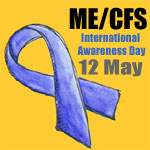 Today is ME/CFS Awareness Day!
Today is ME/CFS Awareness Day!If you're new to this band blog and you've never heard me sound off on ME/CFS, you may be thinking, "What is ME/CFS, and why should I be aware of it?" I'll answer that question and others in a handy FAQ format.
What's ME/CFS?
The "ME" part stands for myalgic encephalomyelitis. The "CFS" part stands for chronic fatigue syndrome.
Oh, chronic fatigue syndrome! Yeah, I've heard of that. I don't get what the big deal is, though. I get tired too.
ME/CFS isn't just being tired. Symptoms vary from person to person, but commonly include:
- chronic, debilitating pain
- post-exertional morbidity—symptoms get worse after physical or mental exertion and require an extended recovery period
- flu-like symptoms, such as joint and muscle pain
- cognitive impairment, including problems with short-term memory
- crushing exhaustion, which is not relieved by rest
- Other common symptoms include cardiac arrhythmias, chemical sensitivities, food sensitivities, blurry vision, eye pain, irritable bowel syndrome, and a host of other conditions that are nasty in their own right.
A friend of mine says she has this thing, but every time I see her, she seems fine. I think she's just a hypochondriac.
Probably not. It's typical for sufferers to have good days and bad days (though a "good day" can still be pretty bad from a healthy person's perspective). If you see someone with ME/CFS out and about, you've probably caught them on a good day. You don't see them lying flat on their back for the rest of the week, in the privacy of their own home, recovering from their trip to the grocery store.
Is there a cure?
No.
Any hope for a cure sometime soon?
Hard to say. The Open Medicine Foundation is working to discover biomarkers and effective treatments, but this disease gets very little funding. And despite the considerable evidence that ME/CFS is biological in origin, much of the funding it does get goes toward questionable psychiatric research.
That's messed up. I wish there were some way I could help.
You can help in more ways than you know. Here are a few ideas:
- Donate to the Open Medicine Foundation, an organization whose primary purpose is finding a cure for ME/CFS.
- Wear your underwear on the outside of your clothes. (It's a fundraising thing, like the ALS Ice Bucket Challenge.)
- Join #MillionsMissing on May 25 to protest the lack of funding for ME/CFS research.
- If you're too sick or too far away to make it to any of the #MillionsMissing physical protest sites, get involved with the virtual protest.
- If you have a friend with ME/CFS, make an effort to keep in touch. Your friend may not have the energy to call you, but he or she would probably love to hear from you.
- If someone you know makes a comment about how chronic fatigue syndrome is just laziness, don't let it pass. Explain that ME/CFS involves serious pain and real impairment, not just greater-than-average tiredness.
Hey, you said this was a band blog. How'd you end up doing ME/CFS advocacy? Seems kinda random.
Same way anyone ends up doing disease-related advocacy: I know someone who has the disease. He had an amazing career and a great life. Now he lies in bed all day, in pain, unable to do any of the things he loved. It sucks. There aren't words to convey how much it sucks.
But being a songwriter, I wrote a song about it. "Everybody Knows About Me" is told from the perspective of someone who lives with the disease ... and other people's prejudices.
So that's something else you can do:
- Send "Everybody Knows About Me" to anyone who might benefit. That includes people who have the disease and people who don't understand it. You can stream it on our website or download it for free on this page (top of the sidebar). Once you've obtained it, make as many copies as you like and send it to as many people as you like.
Thanks for listening.


